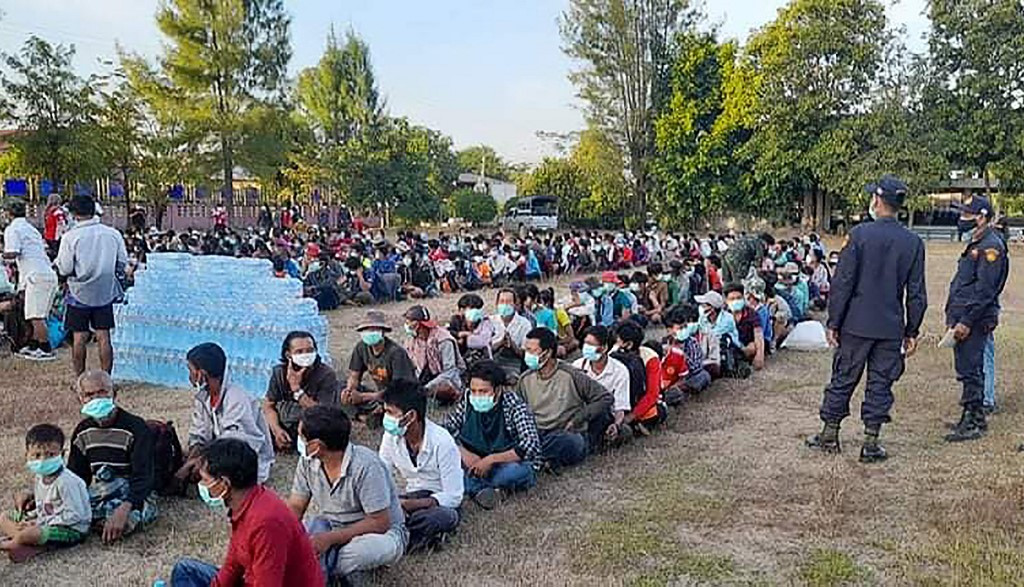Popular Reads
Top Results
Can't find what you're looking for?
View all search resultsPopular Reads
Top Results
Can't find what you're looking for?
View all search resultsThey are not the doctors; they are the disease
Hun Sen's reckless behavior on Myanmar risks undermining the limited progress ASEAN has made so far on the issue.
Change text size
Gift Premium Articles
to Anyone
A
s a first gambit as the incoming chair for ASEAN in 2022 – and in its 50th year no less – Cambodian Prime Minister Hun Sen’s “offer” to visit the junta in Myanmar next month is breathtakingly audacious in all the wrong ways.
Let’s be very clear about what's happening in Myanmar. Senior General Min Aung Hlaing’s coup has plunged the entire country into a multi-dimensional catastrophe and given rise to the most unified and viable alternative to military rule Myanmar has ever seen.
Opposition to the junta has risen in every corner and every sector of the country, and the people are leading a “spring revolution,” complete with a parallel government structure in areas where the military doesn't have control.
The Myanmar military’s policy of all-out terror has brought death, destruction, and disruption upon the people. There have been 1,633 reported incidents of violence against civilians there since the coup on Feb. 1 (compare that to 377 such incidents in Yemen), according to the independent Armed Conflict Location & Event Data Project (ACLED).
Those reported incidents are overwhelmingly due to extreme violence used by the state to repress protests against the military takeover. ACLED data for all such incidents in the 10 ASEAN member nations since Feb. 1, if used in an infographic, would illustrate the black hole the military is burning in the heart of mainland Southeast Asia.
People are being forced to the brink of starvation because of the repeated offensives. The Special Advisory Council-Myanmar (SAC-M), a group of independent experts, has accused the junta of crimes against humanity, including intentionally depriving people of food, by destroying food supplies, killing livestock, and cutting off roads used to transport food and medicine. Military offensives in the country's north-west and east have prevented farmers from harvesting their crops, SAC-M says. Since the coup, two million more people need life-saving assistance.
Just this week, in its Asia Power Index, Australian think-tank Lowy Institute adjusted 2030 gross domestic product forecasts for Asian countries post-pandemic, predicting Myanmar's would need to adjust by a whopping 39.5 percent (second lowest was fellow ASEAN member, Laos, by 18.9 percent).
It’s not as if military rule has ever been successful. The Tatmadaw, as the military is known, has ruled since the 1960s. The challenges it faces today underscore a fundamental failure for which the military must take full responsibility. The Tatmadaw would have the world believe that the military is the guardian of the Union of Myanmar and lasting peace. The reality is entirely different.
For as long as the military has ruled, the people of Myanmar have hoped to emerge from under the jackboot. Every uprising the country has seen has been met with force. Far from being stable, Myanmar under military rule is home to some of the world’s longest civil conflicts, in large part due to the Tatmadaw's belligerence.
Myanmar today is a country at war. Reports from the ground sound like something out of a nightmare, not the dream fantasy of a “discipline-flourishing democracy” hawked by the junta.
Responding to the coup in April, ASEAN agreed on the need for "political stability" in all member states, and the much-discussed but unheeded five-point consensus, which includes the cessation of violence, dialogue among "all parties concerned" and the provision of humanitarian assistance, as well as the establishment of a special envoy.
This approach has been supported by the international community, including the UN Security Council, as well as the governments of the United States, United Kingdom, and South Korea, among others.
Even China – no fan of international accountability on human rights – remarkably accepted ASEAN’s lead on the crisis at the 30th anniversary summit of China-ASEAN Dialogue relations. Beijing ultimately agreed with ASEAN that there should be no representative for Myanmar present at the summit.
The junta has made almost no progress on the five-point consensus, the very reason ASEAN excluded Min Aung Hlaing from the 38th and 39th summits in November. The military has not only refused to cooperate with ASEAN, but appears determined to intensify conflicts and commit further atrocities against its people, to crush the uprising that has emerged nationwide against it. It has even come up with its own five-point roadmap, which it plasters across its official mouthpiece.
There is an international united front to back ASEAN’s position to refuse high-level political representation to the junta – at least there was until Hun Sen stepped in. By welcoming the junta’s foreign minister to visit Phnom Penh this week, the Cambodian prime minister not only granted the generals the legitimization they crave (and which has been denied by the people), but also undermined ASEAN.
Cambodia takes the ASEAN chair on Dec. 29. Any incentive for the junta to accommodate the five-point consensus, so carefully negotiated by the bloc, risks being unilaterally dismantled by Hun Sen.
“We think we are the doctors. We are the disease,” is the saying that comes to mind considering the foolhardy and deluded determination with which Hun Sen and his Myanmar counterpart, Min Aung Hlaing, are pursuing their criminal agenda.
There are eight other members of ASEAN, as the government in Phnom Penh well knows. The last time it chaired the regional bloc and ignored the other members in 2012, ASEAN failed to reach an agreement on a final statement at the summit for the first time, ostensibly choosing to back China’s interest in the South China Sea dispute over ASEAN member interests.
A decade later, Hun Sen is yet again single-handedly undermining ASEAN’s efforts threatening to diminish regional credibility and intensify instability, even before his country officially takes the chairmanship.
***
The writer is chair of ASEAN Parliamentarians for Human Rights (APHR) and a Malaysian member of Parliament.











